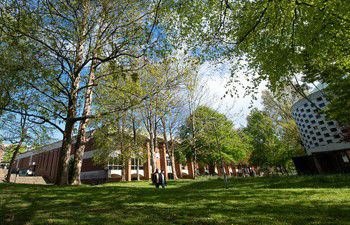Sussex experts appointed to REF 2029 sub-panels
Posted on behalf of: Communications
Last updated: Thursday, 4 September 2025

It has been announced today (Thursday 4 September) that 11 sub-panel members from the University of Sussex have been appointed for the criteria-setting phase of REF 2029, with Sussex represented on nine Units of Assessment.
The REF (Research Excellence Framework) first took place in 2014, again in 2021 and the next assessment will be released in 2029. The framework assesses the quality of research in UK higher education institutions through panels of experts reading and assessing thousands of submissions grouped into specific subject areas - known as Units of Assessment.
The REF plays a major role in determining how public research funding is allocated to universities by Research England and equivalent bodies in the devolved nations. It also raises recognition of the quality and relevance of higher education research, with results feeding into major league tables that significantly influence student and staff recruitment. The 34 Units of Assessment are grouped into four panels: Main Panel A Medicine, Health and Life Sciences; Main Panel B Physical Sciences, Engineering and Mathematics; Main Panel C Social Sciences; and Main Panel D Arts and Humanities. Sussex academics have been selected for all four Main Panels.
Today’s appointments, announced by the four UK higher education funding bodies who run the REF - Research England, the Scottish Funding Council (SFC), Medr (the Commission for Tertiary Education and Research in Wales), and the Department for the Economy (DfE) in Northern Ireland - include the following academics from Sussex:
Main Panel A – Medicine, Health and Life Sciences
- Public Health, Health Services and Primary Care – Professor Chris Chatwin (School of Engineering and Informatics) - Sub-panel Member (assessment phase)
- Psychology, Psychiatry and Neuroscience – Professor Hugo Critchley (Brighton and Sussex Medical School) - Sub-panel Member (assessment phase)
Main Panel B – Physical Sciences, Engineering and Mathematics
- Physics - Professor Seb Oliver (School of Mathematical and Physical Sciences) - Sub-panel Member
- Engineering - Professor Veronica Martinez (University of Sussex Business School) - Sub-panel Member (assessment phase)
Main Panel C – Social Sciences
- Economics and Econometrics – Professor Annemie Maertens (University of Sussex Business School) - Sub-panel Member (assessment phase)
- Law - Professor Jo Bridgeman (School of Law, Politics and Sociology) - Sub-panel Member (assessment phase)
- Sociology – Professor Andy Stirling (University of Sussex Business School) - Sub-panel Member
- Sociology - Professor Gurminder Bhambra (School of Global Studies) - Sub-panel Member (assessment phase)
- Anthropology and Development Studies – Professor Magnus Marsden (School of Global Studies) - Sub-panel Member (assessment phase)
Main Panel D – Arts and Humanities
- Communication, Cultural and Media Studies, Library and Information Management – Professor Joanna Callaghan (Faculty of Media, Arts and Humanities) - Sub-panel member (assessment phase)
- Communication, Cultural and Media Studies, Library and Information Management - Professor Kate O'Riordan (Pro-Vice-Chancellor, Education and Students) - Sub-panel member (assessment phase)
Vice-Chancellor, Professor Sasha Roseneil, said: “I would like to congratulate all 11 members of the Sussex community who have been selected to serve as sub-panel members for REF 2029. It is wonderful to see Sussex represented on all four Main Panels and across such a diverse set of sub-panels. It is all the more pleasing that our academic experts have been appointed through a rigorously competitive and open application process. REF 2029 will both evaluate the past research performance of UK universities and determine the future distribution of research funding, and I am delighted that so many Sussex academics will be playing a vital role in this important exercise. I would also like to thank our distinguished colleagues in advance for the service they will be giving to the UK’s research base and to our world-leading universities through their work on REF 2029.”
For the first time panel members were appointed through an open application process, rather than by nomination, in a process designed to reduce barriers and attract a broader, more inclusive pool of candidates. Sub-panel members will work collaboratively to develop criteria, assess submissions, advise on expertise, collaborate with advisory panels and produce draft outcomes. Those appointed as sub-panel members for the assessment phase will begin their contributions in the assessment phase starting in 2027, whereas full sub-panel members will start earlier. See more detailed information on the roles.
